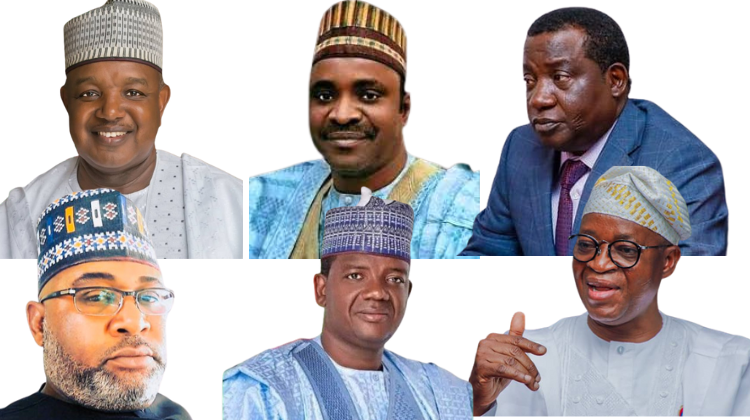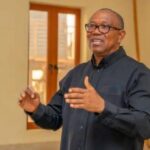
President Bola Tinubu, on Wednesday, forwarded additional 19 ministerial nominees to the Senate for screening and confirmation.
The Chief of Staff to the President and the former Speaker of the House of Representatives, Femi Gbajamiabila, presented the list to the Senate during the plenary.
The President had last week sent the first ministerial nominee list, comprising 28 names, to the Senate.
The Senate began the screening of the first batch on Monday and concluded on Wednesday.
The PUNCH had exclusively reported on Wednesday that the second ministerial nominee list would get to the Senate on Wednesday.
The second list was brought into the Red Chamber by Gbajabiamila in the middle of screening on Wednesday.
The rules of the chamber were suspended at 3:15 pm to allow for the Chief of Staff to enter the Red Chamber.
The list containing 19 names was presented by Gbajabiamila to the Senate President, Godwin Akpabio, who later read out the names.
They are Abdullahi Gwarzo (Kano State); Dr Bosun Tijani (Ogun State); Dr Maryam Shetty, (Kano State); Isiak Salako and Tunji Alausa (Lagos State ).
Others are Dr Yusuf Tanko Sununu (Kebbi State ); Adegboyega Oyetola, ( Osun State ); Atiku Bagudu,(Kebbi State ); Bello Matawalle, ( Zamfara State ); Ibrahim Geidam (Yobe State ), Simon Lalong ( from Plateau State ); Lola Ade John and Shuaibu Abubakar Audu ( from Kogi State).
Also on the list are Prof Tahir Mamman, (Adamawa State); Senator Aliyu Sabi Abdullahi, (Niger State ); Senator Alkali Ahmed Saidu, ( Gombe State ); Senator Heineken Lokpobori (Bayelsa State ); Uba Maigari Ahmadu, (Taraba State ) and Zaphaniah Bitrus Jisalo ( from Federal Capital Territory ).
No fewer than five former governors made the second list.
They are the former governor of Osun state, Oyetola; former Kebbi governor, Bagudu; former Zamfara governor, Mattawale; former governor of Yobe State, Senator Gaidam, and former Plateau governor, Lalong.
The first list had four former governors. Hence, the President’s 47-man cabinet is expected to have nine former governors.
On Wednesday, the Senate concluded the screening of the first batch of nominees. Fourteen had been screened on Monday, nine on Tuesday, the remaining five were screened on Wednesday.
The five nominees screened on Wednesday were the Special Adviser to the President, Special Duties, Communications and Strategy, Dele Alake; former Minister of Health, Ali Pate; a Senior Advocate of Nigeria, Lateef Fagbemi; publisher of BluePrint Newspaper, Muhammed Idris, and Dr Doris Uzoka.
Alake when he appeared before the Senate stated that he would strengthen laws that would regulate the use of social media.
Alake, when asked about his thoughts on the regulation of social media, said, “I’ll strengthen the laws and applications of those laws and I’ll support anything that comes from the hallowed chamber on laws.
“ I’ll support the strengthening of regulations.”
Also, Fagbemi harped on the unbundling of the Economic and Financial Crimes Commission and the Independent Corrupt Practices and other related offences Commission.
Fagbemi in responding to questions on corruption and the rule of law, said, “Truth be told, you fight corruption but at the same time the way it’s fought in Nigeria leaves much to be desired. That is the truth.
“If I have my way, I will advise the President to unbundle, first of all, bring out ICPC, and EFCC together and unbundle them. The investigation should not be handled by the same body there must be a supervisory authority within the same system.”
Fagbemi noted that a prosecution body should be created especially outside of the investigation agency.
He added, “It doesn’t augur well to ask the same authority to do investigation, come and do prosecution. That is when we have a problem.
“Investigation takes time, especially in serious corruption cases, are we prepared to wait? An investigation should be thorough, it shouldn’t be that when a given governor leaves office, let’s go EFCC is investigating you that is not the way to investigate criminal matters.”
Meanwhile, Pate made a case for funding the health sector, stating that without robust domestic funding of healthcare, the gaps in the health sector cannot be bridged.
He said, “The out-of-pocket health spending in Nigeria ($54) grossly outstrips the total government expenditure on health ($12) which amounts to an inconsequential share of the country’s gross domestic product.
“So, in Nigeria, most of the spending on healthcare is from families and the government puts $12 to $14 per person which is roughly one percent of the GDP. Niger, our next-door neighbour that has fewer resources, allocates more than double what we allocate in terms of health spending related to their GDP.
“That’s an indication of prioritization. Ghana similarly, does that. The point I’m making is that domestic financing represents the prioritization given to health. But we are not spending enough, perhaps because the revenue is limited but even within the limited revenue, there’s room to increase the financing for health.”
However, when Malagi appeared before the Senate, the senator from Rivers, Mpigi Barianda, noted that the nominee didn’t present his result but a statement of the result.
Malagi read out his achievements and proffered solutions to some problems in the broadcast sector but evaded the question.
Uzoka answered questions bordering on trade and investments.





